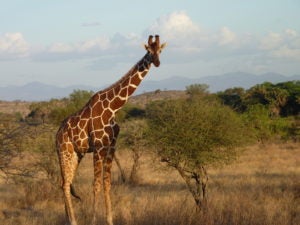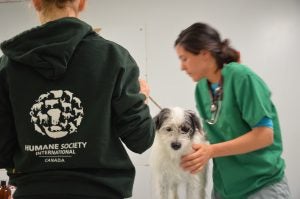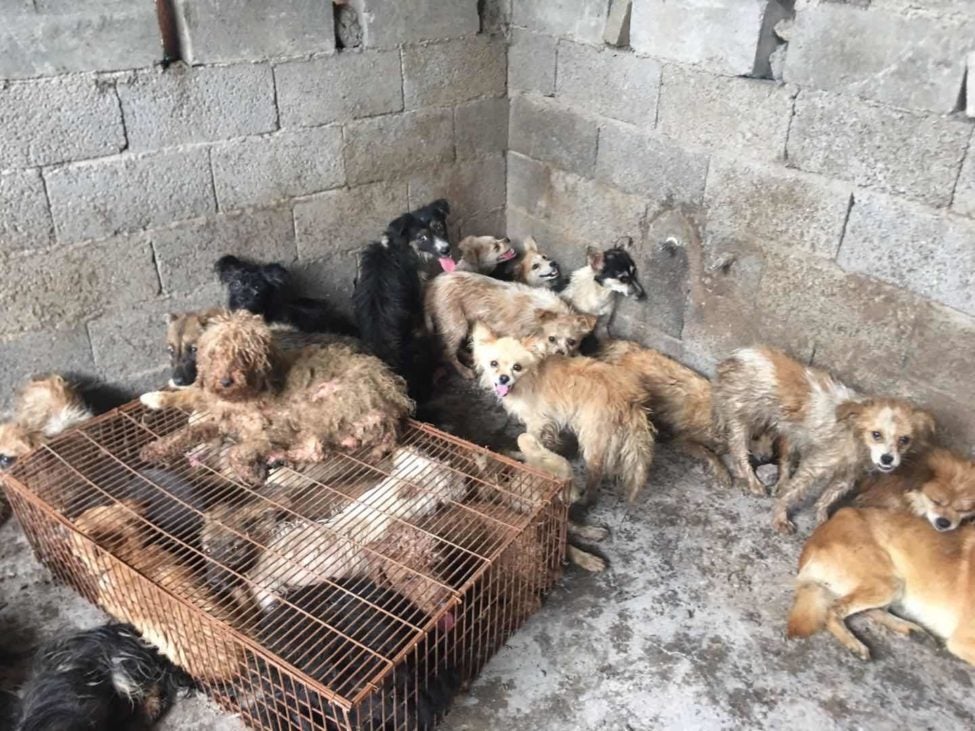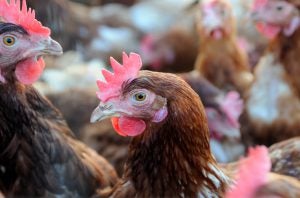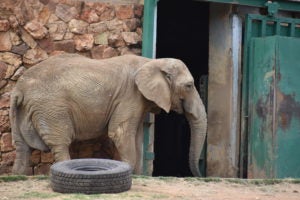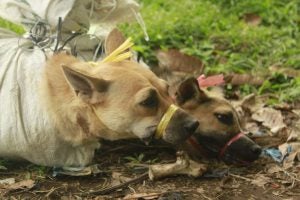
JAKARTA – Indonesia’s Regency of Karanganyar in Java has pledged an action plan to end its brutal dog meat trade, following a shocking investigation by campaign coalition Dog Meat Free Indonesia. The action plan includes closing all 21 stalls selling dog meat in the regency and the creation of alternative livelihoods for those people currently reliant on the trade. The local government plans to host a meeting with the traders and vendors to announce the ban and to discuss alternative livelihood opportunities, a first of its kind in Java.
The Dog Meat-Free Indonesia (DMFI) coalition’s investigations showed dogs being beaten and strung upside down to bleed out whilst still conscious, and in full view of other terrified dogs bound and caged who await their turn. The horrific footage prompted renewed calls for urgent action by campaigners, national and international celebrity ambassadors and concerned citizens from throughout Indonesia and around the world. The action being taken in Karanganyar will save almost 2,000 dogs each month from slaughter, and campaigners are optimistic that this will mark the start of a nationwide movement to tackle this illegal and dangerous trade.
When announcing the development of an action plan Regent of Karanganyar Regency Drs. Juliyatmono denounced the trade, warning of the grave risks to public health it poses. Whilst dog meat is consumed by some for its perceived health properties, the reality is that the dog meat trade poses a significant and very real threat to public health, with rabies transmission being of particularly grave concern. Research shows that the highest prevalence of rabies occurs in provinces and regencies with the highest dog meat consumption., bringing with it devastating consequences for human health, animal welfare and the local economy.
As an ever-growing number of countries and territories in the region and around the world take action to tackle the illegal dog and cat meat trades, global public and political communities are becoming increasingly intolerant to the trades. With the recent Indonesian presidential elections having taken place on April 17, campaigners hope that now is the time for the government to prioritise this issue on grounds of public health and safety as well as animal welfare, and fulfill its pledge to take action to tackle the trade.
Quotes
“In order to prevent various diseases caused by dog meat consumption, we will soon take action to close all dog meat stalls in Karanganyar, so humans can co-exist in harmony with the environment and all living creatures” – Drs. Juliyatmono, M.M, Regent of Karanganyar Regency.
“Pledges for action have been made from the Central government’s Ministry of Agriculture, and the DMFI and the millions of supporters we represent worldwide applaud this position. But these words need to result in commitments for change through strong and impactful actions, like those presented by Drs. Juliyatmono, M.M.” – Karin Franken, Jakarta Animal Aid Network.
”We congratulate the Regency of Karanganyar for addressing these grave concerns for the sake of public and animal health and safety, and call on those in power to take action nationwide. Promises have been made but we need to see programs to end the trade implemented nationwide to protect our communities and animals. The DMFI coalition stands ready to help provide practical and on-the-ground support to secure the dual aims of eliminating both the dog and cat meat trades and rabies” – Angelina Pane, Animal Friends Jogja.
“Now is the time for the Indonesian Central and Provincial governments to take Karanganyar Regency’s lead and to prioritise this issue on grounds of public health and safety as well as animal welfare, and fulfill their pledge to take action to tackle the trade. The trade is cruel and dangerous, and the time is now for action to be taken!” – Lola Webber, Change for Animals Foundation.
FACTS
- Dog Meat-Free Indonesia (DMFI) is a coalition of national and international animal protection organisations comprising Change For Animals Foundation, Humane Society International, Animals Asia, FOUR PAWS, Animal Friends Jogja and Jakarta Animal Aid Network which documents the brutality of the trades and campaigns for a ban on grounds of animal cruelty and risks to public health.
- Dog theft for the meat trade is a serious problem in Indonesia. DMFI has interviewed many residents who have described their terrifying ordeal with armed traders stealing their pets at night. Despite the obvious law-breaking, thefts are rarely taken seriously by law enforcement, so the thieves go unpunished.
- The illegal movement of large numbers of dogs of unknown disease status into densely-populated areas impedes efforts to protect communities from the deadly rabies virus. This contravenes rabies control recommendations by leading human and animal health experts including the World Health Organization, the Pan American Health Organization, and the Food and Agriculture Organization of the United Nations as well as national disease prevention legislation.
- Studies reveal a high incidence of rabies-positive dogs in slaughterhouses and markets throughout the region, including Indonesia. For example, in 2007 research from markets in North Sulawesi (Manado, Airmadidi and Langowan) showed between 7.8 and 10.6 percent of dogs sold for human consumption were infected with rabies. In 2018 the DMFI coalition found that of just 10 dog carcass samples sold for human consumption in Tomohon, one tested positive for rabies.
- In August 2018 at the National Coordination of Animal Welfare meeting in Jakarta, the Indonesian Government pledged to end the dog and cat meat trades. Mr Syamsul Ma’arif DVM, M.Si, director of veterinary public health, described the trades as “torture for animals” and added that “dog meat or any animal that is not registered as farm animals, is illegal”.
- Globally, opposition to the dog and cat meat trades is increasing, with an ever-growing number of countries and territories in the region (Taiwan, Hong Kong, the Philippines and Thailand) and internationally (the United States) banning the trade in and slaughter, sale, consumption of dogs.
The Dog Meat-Free Indonesia campaign has received support from global and Indonesian superstars including Simon Cowell, Sophia Latjuba, Yeslin Wang, Nadia Mulya, Lawrence Enzela, Cameron Diaz, Chelsea Islan, Ellen DeGeneres, Alya Nurshabrina, Shaggydog and Pierce Brosnan who last year signed a letter to President Joko Widodo calling for action to end the country’s dog and cat meat trades. A petition of more than 1 million signatures was also submitted to the government of Indonesia in November 2018


